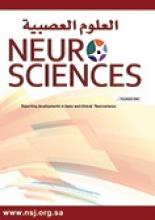Abstract
Enterococci are responsible for an increasing number of human infections. They are normally part of the flora of the human gastrointestinal tract, buccal cavity, perineal skin, vagina, urethra and gallbladder, but may occur as pathogens in several sites causing urinary tract infections, intra-abdominal infections, fatal bacteremia, meningitis and endocarditis. Enterococcus avium is a rare cause of infection in humans. Here, we report a 19-year-old Saudi girl diagnosed as a case of astrocytoma grade II arising from the right thalamus. She underwent treatment with radiotherapy followed by 5 chemotherapy sessions. She subsequently developed a cerebral abscess, and we performed mini craniotomy of the left parietal region with drainage of the brain abscess. The pus obtained from the abscess grew Enterococcus avium. We successfully treated her with antibiotics and discharged her home. The rarity of the organism causing cerebral abscess has motivated the documentation of this case and the pathogenesis of Enterococcus avium.
- Copyright: © Neurosciences
Neurosciences is an Open Access journal and articles published are distributed under the terms of the Creative Commons Attribution-NonCommercial License (CC BY-NC). Readers may copy, distribute, and display the work for non-commercial purposes with the proper citation of the original work.






